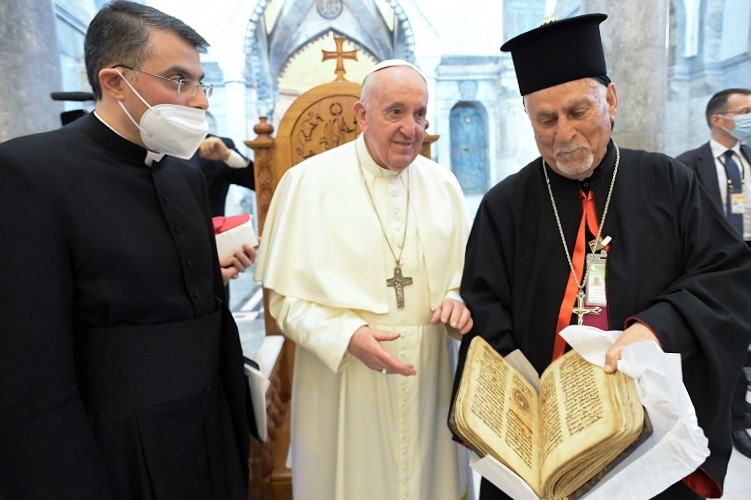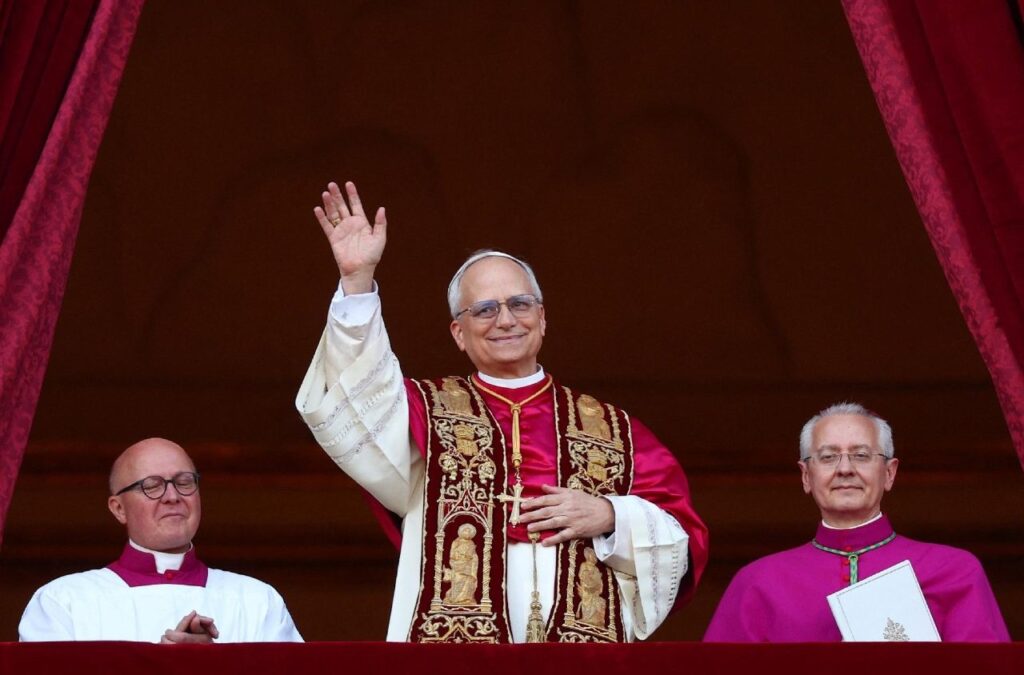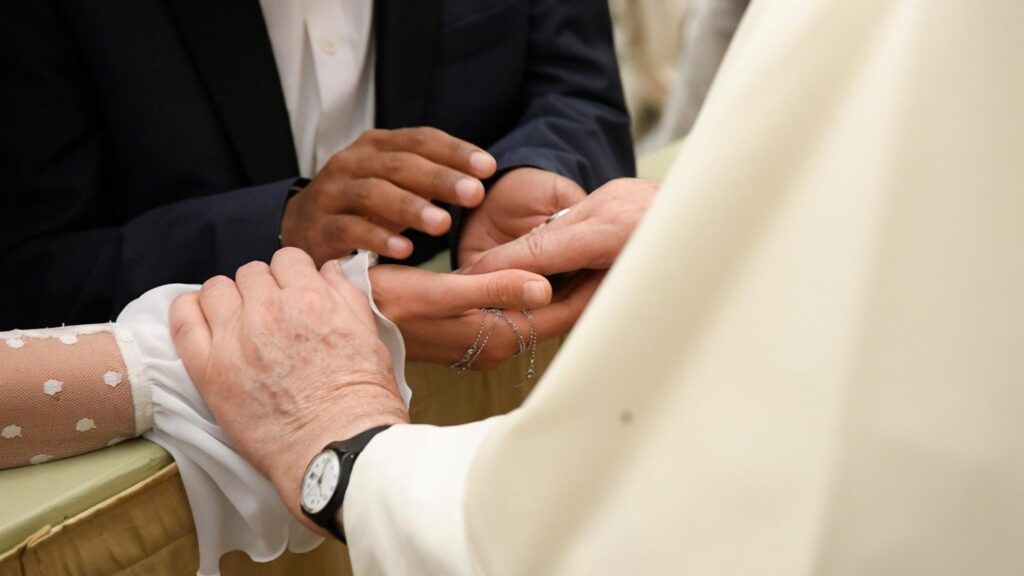The Pope’s Historic Trip to Iraq: Human Fraternity
Review of the Most Important Moments

Peruvian journalist Jose Antonio Varela shares with Exaudi’s readers the article “Pope Francis in Iraq: Living Human Fraternity: A Christian People Called to Be Leaven in the Dough,” published by the Archdiocese of Miami on Pope Francis’ historic trip to Iraq in March of 2021.
* * *
Last March 5, Pope Francis arrived in Iraq, a country of the Middle East prey of its internal conflicts, to which he took a message of peace and hope. Thus the Holy Father began a risky Apostolic Journey, which opened with a warm welcome in Baghdad.
After greeting the Prime Minister and the President, the Pontiff gave an address to the national Authorities, to the civil society, and to the Diplomatic Corps. Then he had a meeting with Catholic consecrated persons serving in that land, wounded by violence and war, where hundreds of Christians have been martyred.
Other events that marked his trip were the meeting with the Islamic leader, the Grand Ayatollah Sayyid Ali Al-Hussein Al-Sistani. Regarding this event, Francis said that it had been a message for all the religious community, pointing out that the Muslim leader was very respectful in the meeting, and that he felt honored to have been received. He highlighted the fact that the elderly leader stood up twice to embrace him, a gesture that the leader doesn’t do with anyone, given the very high spiritual position that he holds in his country.
Remaining in the retina of pacifists and those that aren’t so, is the symbolic visit to the plain of Ur, as it is a territory in which Jews and Christians acknowledge it as the place from which God called the Patriarch Abraham. An inter-religious meeting was held there with the most important leaders of Islam in Iraq and neighboring countries.
In an editorial, the Vatican press pointed out how the Pope took advantage of the moment to point out that religious leaders are called to unmask violence that is disguised as alleged sacredness and to bring to light the attempt to justify all forms of hatred in the name of religion and to condemn them as an idolatrous falsification of God.
After celebrating Mass in the Chaldean Rite, the Holy Father flew to the city of Mosul, where he prayed amid the ruins of a church attacked by terrorists of the Islamic State (ISIS). His visit ended with a crowded Mass in the Franso Hariri Stadium of Erbil.
Pope Francis returned a historic manuscript of prayers in Aramaic, restored after its profanation by militants of the Islamic State, to the Catholic Church, where it was kept before.
The Faithful Remnant
Everyone knows the great suffering that the Iraqi people in general and Christians, in particular, have endured, due to the internal conflict with ISIS, which has sown grief and death in that country and others, where its genocide army has been acting mercilessly.
That is why the Pope encouraged Christians to “persevere in this commitment, to guarantee that the Catholic community in Iraq, although small as a mustard seed, can continue enriching the whole country’s path.”
The Pope recalled there that extremism and violence do not stem from a religious spirit but, on the contrary, are betrayals of religion. Another event of communion with Catholics of the East was the Eucharistic celebration presided over by Francis in Baghdad, this time in the Chaldean Rite, which is the way the Sacrament is celebrated in this millennial Church.
A significant event was the prayer in Mosul, specifically in one of the churches destroyed by ISIS in several terrorist attacks. There, in a scenario that mixed desolation and impotence, the Holy Father raised his voice to assert that it’s not licit to kill brothers in the name of God. He said this in a clear reference to those extremist groups that fly the flag to “distinguish” between the pure and impure in religions.
Later, in Qaraqosh, the only Iraqi city with a Christian majority, he stretched out his arms to welcome and be welcomed by the Catholic community, gathered around him in the recently rebuilt Cathedral of the Immaculate Conception. Francis and the entire community were moved there by the testimony of a Christian mother who forgave those that killed her small son in a terrorist attack.
Francis filled the faithful and their Pastors with words of encouragement, calling them not to give up or lose hope. At the end of his tour, he arrived in the city of Erbil to preside over a Eucharist where, as a summary of his visit and in answer to the fearful consequences of this trip, he said he had been able to see and feel that Iraq’s Church was alive and that Christ is alive and acts in these holy and faithful people.
Echoes of the Trip
In the return flight to Rome, during a meeting with the journalists that accompanied him, Francis said that in this trip the spirit of the Abu Dhabi Document of February 4, 2019 — signed with the Imam of Al-Azhar –, was evident. This document made it clear that human fraternity is important, in which all of us men recognize one another as brothers. “You are my brother; you are a son of God; you are my brother, that’s it,” were the words of the Pope, who assured that he risked a lot in this visit, but which had to be carried out in any event. In a scoop-tinted sneak peek for the men of the press — who immediately made the announcement viral –. Francis took advantage to announce an eventual trip to Lebanon, and the probability that in September he will be present for the closing of the International Eucharistic Congress, which will be held in Hungary.
In regard to Lebanon, the Holy Father pointed out that it is a country, which although it suffers, has the strength of a great, reconciled people, as the strength of the cedars, alluding to the symbol of its flag, which is mentioned in the Old Testament. He recalled that Patriarch Rai asked him on this occasion to make a stopover in Beirut, but he preferred to promise him that he would soon organize a more complete trip.
Subsequently and now from the Vatican, Francis took advantage of the global attention that the Wednesday General Audience arises to recall – with much gratitude — his historic trip to Iraq, describing Iraqis as a people with millennial roots, which has the right to live in peace and to recover its dignity.
Related

Faith as a Pillar of Unity: Pope Leo XIV’s First Homily in the Sistine Chapel
Exaudi Staff
09 May, 2025
2 min

The new Pope, Leo XIV
Exaudi Staff
08 May, 2025
5 min

A sign of reconciliation: The Pope sends an aid vehicle to Gaza
Exaudi Staff
06 May, 2025
1 min

Pope Francis to young couples in an unpublished text: believe in the “joy of love”
Exaudi Staff
01 May, 2025
2 min
 (EN)
(EN)
 (ES)
(ES)
 (IT)
(IT)

